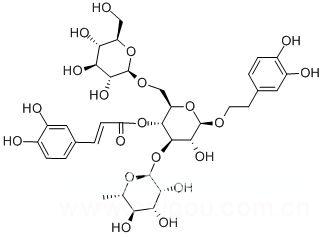The Benefits of Echinacoside
Echinacoside (ECH) is a phenyl ethanol glycoside compound derived from the rhizome of Echinacoside and mainly extracted from cistanche deserticola. Modern medical studies have found that echinoside has antioxidant, anti-inflammatory, neuroprotective, improving learning and memory, anti-tumor, liver protection and many other pharmacological effects. Here this article will introduce the main therapeutic effects of ECH.
Echinoside and Alzheimer’s disease
Alzheimer’s Disease (AD) is a typical neurodegenerative Disease and common senile dementia. The incidence of the disease, high rate of death and disability, great harm. The deposition of amyloid beta is considered to be the main pathological change of AD, which can trigger er stress and lead to the up-regulation of BACE1 protein expression, which induces further accumulation of amyloid beta, forming a vicious cycle, leading to the deterioration of the disease. Endoplasmic reticulum stress results in abnormal accumulation of cytoskeleton protein F-actin, which damages the connection between endoplasmic reticulum and plasma membrane, resulting in functional damage of endoplasmic reticulum.
It was found that echinoside, the main active component of C. cistanche, inhibited the phosphorylation of er stress receptor protein PERK, and then regulated BACE1 expression at the post-transcriptional level through translation initiation factor eIF2α. In this study, echinoside inhibited endoplasmic reticulum stress induced by amyloid beta by regulating amyloid beta processing and upregulation of molecular chaperone GRP78, and improved spatial learning and memory ability of APP/PS1 transgenic mice. We also found that echinoside can promote cytoskeletal protein F-actin remodeling by promoting the binding of PERK to FLNA, protecting the structure of the er – PLASMA membrane junction, and improving er – plasma membrane function. Through molecular docking and MST experiments, echinoside specifically bonded to mouse and human PERK proteins in intramolecular furrow, respectively, confirming the exact target of the drug molecular action.
Antitumor effect
ECH can inhibit the proliferation of human hepatoma cells, osteosarcoma cells, breast cancer cells and colorectal cancer cells. It has been found that ECH can inhibit the tumor cell cycle and repair enzyme activity by inhibiting the oxidative damage of nucleic acid, increasing the oxidation of nucleic acid, leading to DNA double-strand break and mitochondrial membrane potential loss, triggering the mitochondria-dependent internal apoptosis pathway, increasing the apoptosis of malignant tumor cells, and then inhibiting the growth of malignant tumor. This effect only applies to malignant tumor cells, and has no effect on normal tissue cells.
It was previously believed that the occurrence and development of malignant tumors were related to the increase of ROS levels. However, in recent years, more and more studies have found that antioxidant effects such as ROS clearance can promote the occurrence, development and metastasis of tumors, transcription factors can make ROS lose toxicity, and their deletion can inhibit tumor formation. These results suggest that increasing ROS levels in cancer cells can be a new idea for anti-tumor therapy. ECH can induce ROS production, lead to mitochondrial membrane potential loss, act on MAPK signal transduction pathway, and reduce the activities of amino-terminal kinase and extracellular regulatory protein kinase, thus inhibiting pancreatic cancer cell growth.
Liver protection
ECH has been found to have significant benefits for acute liver injury and liver fibrosis. ECH can inhibit acute liver injury induced by concanavalin A. By reducing the level of extracellular histone and its downstream cytokines as inflammatory mediators, it can reduce liver inflammation and damage, play a protective role in the liver, and also inhibit the activation of hepatic stellate cells to fight liver fibrosis.
In addition, ECH can also improve testicular and sperm damage, improve hematopoietic function under bone marrow suppression and inhibit the development of ulcerative colitis. In general, ECH has extremely high medicinal value, with many pharmacological effects such as antioxidant, anti-inflammatory, neuroprotection, improvement of learning and memory, anti-tumor, liver protection and so on. ECH has been applied in the treatment of multiple systemic diseases.



